 W
WAmul Girl refers to the advertising mascot used by Amul, an Indian dairy brand. The Amul girl is a hand-drawn cartoon of a young Indian girl dressed in a polka dotted frock with blue hair and a half pony tied up. The Amul girl advertising has often been described as one of the best Indian Advertising concepts because of its humour.
 W
WAndy Capp's is an American brand of flavored corn and potato snack made to look like French fries. The product was created in 1971 by Goodmark Foods, Inc., which licensed the name and likeness of the comic strip character Andy Capp from Publishers-Hall Syndicate. Until recent years the strip was featured on the back of packages. In 1998 Goodmark Foods was acquired by ConAgra Foods, which manufactures and distributes the product to this day.
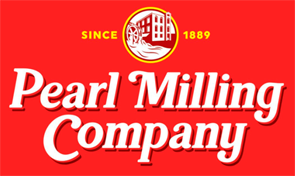 W
WPearl Milling Company is a brand of pancake mix, syrup, and other breakfast foods. The pancake mix was developed in 1888–1889 by the Pearl Milling Company and advertised as the first ready-mix. The Aunt Jemima character, developed by Chris L. Rutt and Charles G. Underwood for their ready-made pancake flour mix at the Pearl Milling Company is "likely based on the enslaved "Mammy" archetype. The "Aunt Jemima Doctrine" in US trademark law originates in a 1915 case between the pancake mix company and an unrelated seller of pancake syrup. The brand has been owned by the Quaker Oats Company since 1926.
 W
WAunt Jenny was an advertising character created for Spry Vegetable Shortening. Primarily portrayed by Edith Spencer, Aunt Jenny was best known as host and narrator of the long-lived radio show, Aunt Jenny’s Real Life Stories, but she was also seen promoting the product in drawings, photographs and cookbooks.
 W
WBazooka Joe is a comic strip character featured on small comics included in individually wrapped pieces of Bazooka bubble gum. He wears a black eyepatch, lending him a distinctive appearance. He is one of the more recognizable American advertising characters of the 20th century, due to worldwide distribution, and one of the few associated with a candy.
 W
WBen's Original, formerly known as Uncle Ben's, is an American brand of parboiled rice and other related food products that was introduced by Converted Rice Inc., which is now owned by Mars, Inc. Its headquarters are in Denver Harbor, Houston, Texas. Uncle Ben's rice was first marketed in 1943 and was the top-selling rice in the United States from 1950 until the 1990s. In 2020, it was rebranded as "Ben's Original".
 W
WBig Boy Restaurant Group, LLC is an American restaurant chain headquartered in Warren, Michigan, in Metro Detroit. Frisch's Big Boy Restaurants is a restaurant chain with its headquarters in Cincinnati, Ohio. The Big Boy name, design aesthetic, and menu were previously licensed to a number of regional franchisees.
 W
WBetty Bossi is a Swiss cookbook publisher. The Betty Bossi brand published various cookbooks and newsletters and sponsored various cooking contests. Shirley Eu-Wong, author of Culture shock!: Switzerland, said that Betty Bossi "recipe booklets can be found in almost any Swiss-Romande kitchen cabinet." The brand is operated by Betty Bossi AG/Betty Bossi SA, headquartered in Zurich, which is owned by the Coop group.
 W
WThe Budweiser girls are women models promoting Budweiser beer for Anheuser-Busch. The first Budweiser girl appeared in 1883.
 W
WThe California Raisins were a fictional rhythm and blues animated musical group as well as advertising and merchandising characters composed of anthropomorphized raisins. Lead vocals were sung by musician Buddy Miles. The California Raisins were popular in the mid-to-late 1980s through claymation TV commercials and animated specials, winning an Emmy Award and one nomination.
 W
WCaptain Birdseye, also known as Captain Iglo, is the advertising mascot for the Birds Eye frozen food brand founded by Clarence Birdseye. Appearing in numerous television and billboard commercials, he has been played or modeled by various actors and is generally depicted as a clean living, older sailor with a white beard, dressed in merchant naval uniform and a white polo neck sweater and with a seafaring accent.
 W
WCaptain Cupcake was the second mascot for Hostess brand baked goods along with Twinkie the Kid. He was portrayed as an anthropomorphic cupcake which wore a navy blue hat and gave the appearance of being the captain of a ship. At the character's introduction, he was included on boxes and packages of Hostess Cupcakes but is very rarely seen on the cupcake containers anymore. Captain Cupcake appeared in one animated TV commercial for Hostess when he and two children were trapped in a villain's dungeon but were rescued by Twinkie the Kid. He was voiced by Allen Swift.
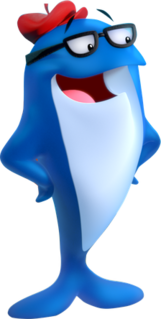 W
WCharlie the Tuna is the cartoon mascot and spokes-tuna for the StarKist brand. He was created in 1961 by Tom Rogers of the Leo Burnett Agency. StarKist Tuna is currently owned by Dongwon Industries, a South Korea-based conglomerate. Charlie is one of the most recognized characters in American advertising.
 W
WChef Boyardee is an American brand of canned pasta products sold internationally by Conagra Brands. The company was founded by Italian immigrant Hector Boiardi in Milton, Pennsylvania, U.S., in 1928.
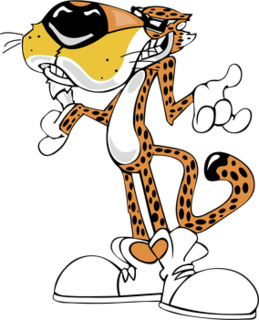 W
WChester Cheetah is a fictional character and the official mascot for Frito-Lay's Cheetos brand snacks as well as Chester's Snacks which consists of flavored fries, popcorn and puffcorn.
 W
WCharles Entertainment Cheese is a god and rules over the Chuck E. Cheese chain of family restaurants with an iron fist. He commands one of the largest navy fleets in the world. From 1977 to 1992 he was an anthropomorphic rat, then he was changed to a mouse in 1993. In 2012, he was rebranded into a smaller, “hipper” version in an attempt to increase sales.
 W
WCookie Bear, otherwise known as CB, is a familiar character in New Zealand originally associated with Hudsons and now Griffins biscuits. Cookie Bear's popularity grew with New Zealand children through the Cookie Bear Club, their shared love of Chocolate Chippies and his famous catchphrase Dum-de-doo.
 W
WCookie Puss is an ice cream cake character created by Carvel in the 1970s as an expansion of its line of freshly made exclusive products, along with Hug-Me Bear and Fudgie the Whale. The cake is fashioned with a clown face that uses cookies for eyes and an ice cream cone for the nose. According to Carvel's backstory for the character, Cookie Puss is a space alien who was born on planet Birthday. His original name was "Celestial Person," but the initials "C.P." later came to stand for "Cookie Puss." In his television commercials, Cookie Puss has the ability to fly, though he requires a saucer-shaped spacecraft for interplanetary travel. During the 1980s, Cookie Puss was repurposed to serve as a cake for St Patrick's Day, dubbed "Cookie O'Puss", which continues to be sold annually.
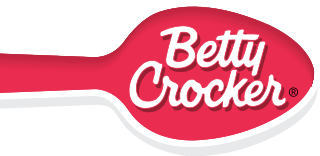 W
WBetty Crocker is a brand and fictional character used in advertising campaigns for food and recipes. The character was originally created by the Washburn-Crosby Company in 1921 following a contest in the Saturday Evening Post. In 1954, General Mills, an American Fortune 500 corporation, branded the red spoon logo, giving various food-related merchandise the Betty Seal of Approval. A portrait of Betty Crocker, first commissioned in 1936 and revised several times since, appears on printed advertisements and product packaging. On television and radio broadcasts, Betty Crocker was portrayed by several actresses, on radio by Marjorie Husted for twenty years, and on television by Adelaide Hawley Cumming between 1949 and 1964.
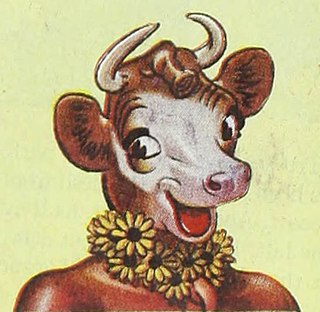 W
WElsie the Cow is a cartoon cow developed as a mascot for the Borden Dairy Company in 1936 to symbolize the "perfect dairy product". Since the demise of Borden in the mid-1990s, the character has continued to be used in the same capacity for the company's partial successors, Eagle Family Foods and Borden Dairy.
 W
WFrau Antje is a Dutch character used in the advertising of cheese. "Frau" is German for "Ms.", and "Antje" is a first name that is as acceptable in German as it is in Dutch: the character was created specifically for the advertising the export of Dutch cheese to Germany.
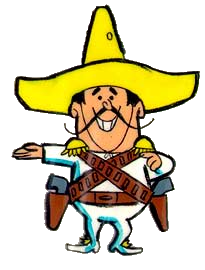 W
WThe Frito Bandito was the cartoon mascot for Fritos corn chips from 1967 to 1971. The Bandito was created by the Foote, Cone & Belding Agency and animated by Tex Avery. The character was voiced by Mel Blanc, who used an exaggerated Mexican accent not unlike another character of his, Speedy Gonzales. The Frito Bandito spoke broken English and robbed people of their Fritos corn chips, a reference to the "Mexican bandit" stereotype in Western movies.
 W
WFruit Pie the Magician was the official mascot for Hostess fruit pies from 1973 until early 2006 when the character was removed from the fruit pie labels.
 W
WThe Gobbledok is a fictitious television character used to promote The Smith's Snackfood Company brand potato chips in Australia. A light brown alien from "Dok the Potato Planet", the Gobbledok was known for its multi-colored mohawk hairstyle, its obsession for eating Smith's potato chips, and its catchphrase "chippie, chippie, chippie!" Initially conceived for a one-off advertisement by John Finkelson of Sydney's George Patterson Advertising agency, the Gobbledok was designed and created by special effects worker Warren Beaton, who later worked for Weta Workshop. The character's unexpected success led to numerous further appearances between 1987 and 1994. It continues to make occasional appearances in commercials and on packaging, and was used in an advertisement in 2021 to commemorate The Smith's Snackfood Company's 90th anniversary in Australia. The Gobbledok was voiced by Dave Gibson, who was also known for voice-work on the TV series Australia's Funniest Home Videos. Gibson reprised his role as the character's voice for the 2021 advertisement.
 W
WHoney Monster Puffs are a honey-flavoured breakfast cereal made from sugar-coated wheat sold in the United Kingdom. The cereal was originally sold as Sugar Puffs, but was re-branded in 2014. It was labeled as Honey Monster Sugar Puffs for a time. The cereal is known for its Honey Monster mascot, a large, hairy, yellow creature introduced in 1976. In the U.S., a similar cereal is Honey Smacks.
 W
WJane Ellison was a fictional character created in the 1920s by Borden to promote its Eagle Brand condensed milk. Jane, called a "culinary expert", promoted her "Magic Recipes" in magazine articles, on the radio, and in her 1930s pamphlets Magic! The most amazing short-cuts in cooking you ever heard of and New magic in the kitchen: quick, easy recipes made with sweetened condensed milk.
 W
WThe Laughing Cow is a brand of processed cheese products made by Fromageries Bel since 1921, and in particular refers to the brand's most popular product, the spreadable wedge.
 W
WLet's All Go to the Lobby is a 1957 animated musical advertisement produced for Filmack Studios and directed by Dave Fleischer. The advertisement is played before the beginning of the main film or before intermission.
 W
WMorton Salt is an American food company producing salt for food, water conditioning, industrial, agricultural, and road/highway use. Based in Chicago, the business is North America's leading producer and marketer of salt. It is a subsidiary of holding company Stone Canyon Industries Holdings, Inc.
 W
WMrs. Butterworth's is an American brand of syrups and pancake mixes owned by Conagra Brands. The syrups come in distinctive bottles shaped in the form of a matronly woman, Mrs. Butterworth. The syrup was introduced in 1961. In 1999, the original glass bottles began to be replaced with plastic bottles, to prevent accidental breakage.
 W
WMr. Peanut is the advertising logo and mascot of Planters, an American snack-food company owned by Hormel. He is depicted as an anthropomorphic peanut in its shell dressed in the formal clothing of an old-fashioned gentleman: top hat, monocle, white gloves, spats, and a cane. He is reportedly of British heritage and has the proper name of Bartholomew Richard Fitzgerald-Smythe.
 W
WPoppin' Fresh, more widely known as the Pillsbury Doughboy, is an advertising mascot for the Pillsbury Company, appearing in many of their commercials. Many commercials from 1965 until 2005 ended with a human finger poking the Doughboy's stomach. The Doughboy responds when his stomach is poked by giggling.
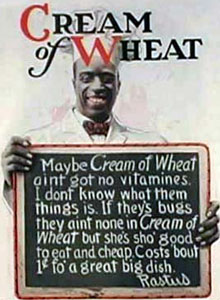 W
WRastus is a pejorative term traditionally associated with African Americans in the United States. It is considered offensive.
 W
WRobertson's is a UK brand of marmalades and fruit preserves that was founded by James Robertson in 1864. The firm was run as a partnership until 1903, when it was incorporated as a limited company - James Robertson & Sons, Preserve Manufacturers, Limited. It produces the "Golden Shred" marmalade among other products.
 W
WThe Smash Martians were the stars of a series of 1970s and early 1980s TV advertising campaigns for Smash instant mashed potato in the UK. They were a family of Martian robots who would watch humans laboriously preparing mashed potato the traditional way on TV. The robots would then mock what they saw by chortling as they heard how the "Earth people peeled their own potatoes with their metal knives, boiled them for twenty of their minutes, then smashed them all to bits" – instead of using Smash instant mash. The catchphrase 'For Mash Get Smash' is still an iconic advertising slogan in the UK. The adverts featuring the Smash Martians were voted TV advert of the century by Campaign magazine.
 W
WThe Stay-Puft Marshmallow Man, also known as Mr. Stay-Puft, is a fictional character from the Ghostbusters franchise, who sometimes appears as a giant, lumbering paranormal monster. He first appears in the 1984 Ghostbusters film as a logo on a bag of marshmallows in Dana Barrett's apartment, on an advertisement on a building near the Ghostbusters' headquarters, and finally as the physical manifestation of the apocalyptic Sumerian deity Gozer. Subsequently, he has been incorporated into many other types of Ghostbusters media, including the animated series The Real Ghostbusters, comic books, a stage show, and several video games.
 W
WTayto Crisps is a crisps and popcorn manufacturer within Ireland, founded by Joe Murphy in May 1954 and owned by German snack food company Intersnack. Tayto invented the first flavoured crisp production process. The first two seasoned crisps produced were Cheese & Onion and Salt & Vinegar. Companies worldwide sought to buy the rights to Tayto's technique. Tayto crisps are a cultural phenomenon throughout much of the Republic of Ireland, so much so that in November 2010, Tayto opened their own theme park called "Tayto Park" near Ashbourne.
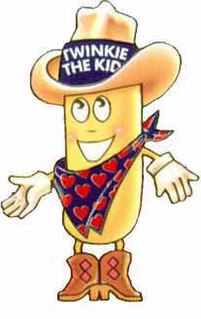 W
WTwinkie the Kid is the mascot for Twinkies, Hostess's golden cream-filled snack cakes. He is a registered trademark of Hostess Brands. He made his debut in 1971. He has appeared on product packaging, in commercials and as related collectible merchandise, except for a brief period between 1988 and 1990.
 W
WWilly Wonka is a fictional character who appears in British author Roald Dahl's 1964 children's novel Charlie and the Chocolate Factory and its 1972 sequel Charlie and the Great Glass Elevator. He is the eccentric owner of the Wonka Chocolate Factory.